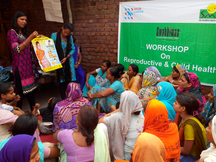|
When money is tight, the well-being of the woman is put to the side. Ranjana Kumari, a women's rights activist and the director of the Center for Social Research in New Delhi stated, “The mental conditioning of Indian society has led to women having a very high threshold of patience and silence.” (DW). Their health is not seen as a priority in many people’s eyes and women have simply accepted it.
Growing up in an Indian household, I have personally seen the taboo around women’s health and hygiene; periods being an unspoken topic and seen as almost shameful. To break the stigma of women’s healthcare and end gender bias care, it is crucial that everybody is taught about the importance of taking care of their health, despite their identity or background. Healthcare is a basic human right and we must work to aid rural communities, such as the ones in India, to ensure that they get the care they need. Small workshops are often held in villages to teach women about their health, which is something that should be incorporated in the entire country and even the world. They should know that taking care of themselves is essential and not something to be dismissed or ashamed of. Works Cited (www.dw.com), Deutsche Welle. “Access to Health Care a Distant Dream for Most Indian Women: DW: 21.08.2019.” DW.COM, 21 Aug. 2019, www.dw.com/en/access-to-health-care-a-distant-dream-for-most-indian-women/a-50108512. Rathaur, : Shivanshi, et al. “Healthcare for Women in India - Smilefoundationindia Health Cannot Wait.” Smilefoundationindia, 9 Jan. 2020, www.smilefoundationindia.org/blog/women-healthcare-in-india/. Sood, Pragya. “‘Only 18% Women in India Have Access to Sanitary Hygiene in India’ - Times of India.” The Times of India, The Times of India, 11 July 2018, https://timesofindia.indiatimes.com/life-style/health-fitness/health-news/only-18-women-in-india-have-access-to-sanitary-hygiene-in-india/articleshow/64931350.cms Comments are closed.
|
|

